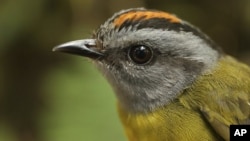Scientists have recreated a 1985 study of birds in Peru that shows climate change is pushing them from their natural environment.
Thirty years ago, researchers studied more than 400 kinds of birds living on a mountainside in Peru. In 2017, researchers looked again at the bird populations. They found that almost all had moved to higher places in the mountain. Almost all had decreased in size. And, the scientists say at least eight bird groups that started at the higher elevations had died out completely.
John W. Fitzpatrick is director of the Cornell Laboratory of Ornithology and a co-writer of the study. He said, “Once you move up as far as you can go, there’s nowhere else left.”
The researchers say the birds might have moved up the mountain because of temperature changes. Or, they say, changes to food sources may have forced them to go higher.
The findings were published in the Proceedings of the National Academy of Sciences.
Past research has documented birds and other animals moving up in elevation in reaction to warming temperatures. Mark Urban is director of the Center of Biological Risk at the University of Connecticut. He said this recent study was the first to prove that rising temperatures and moving to avoid them can lead to extinction.
In 1985, Fitzpatrick and a team of scientists established a camp alongside a river running down a mountainside in southeastern Peru. He wanted to document where tropical bird groups there lived. His team spent several weeks using nets to catch and release birds. They kept detailed notes of birds they caught, saw or heard.
In 2016, Fitzpatrick passed his notes, photos and other records to Benjamin Freeman. He is with the Biodiversity Research Centre at the University of British Columbia. Freeman has been researching tropical birds for more than 10 years. He set out in August and September of 2017 to copy Fitzpatrick’s study. His team used the same methods, searching the same places in the same time of year.
Freeman’s team wanted to see how things had changed for the bird groups since 1985. The average temperatures on the mountain had risen 0.42 degrees Celsius.
Freeman’s team placed 20 sound recording devices on the mountain to record the sounds of birds that might not easily be seen.
Freeman said that the birds moved an average of 98 meters further up the mountain. He said he believes that temperature is the main cause of the birds’ movement.
Fitzpatrick noted that birds used to living in areas with little temperature change may be especially at risk because of climate change. He said, “We should expect that what’s happening on this mountain top is happening more generally in the Andes, and other tropical mountain ranges.”
I’m Jonathan Evans.
Christina Larson reported this story for the Associated Press. Jonathan Evans adapted it for Learning English. Caty Weaver was the editor.
_________________________________________________________________
Words in This Story
ornithology – n. the study of birds
extinction – n. the state or situation that results when something (such as a plant or animal species) has died out completely
tropical – adj. of, relating to, occurring in, or used in the tropics
range – n. a series of mountains or hills in a line





